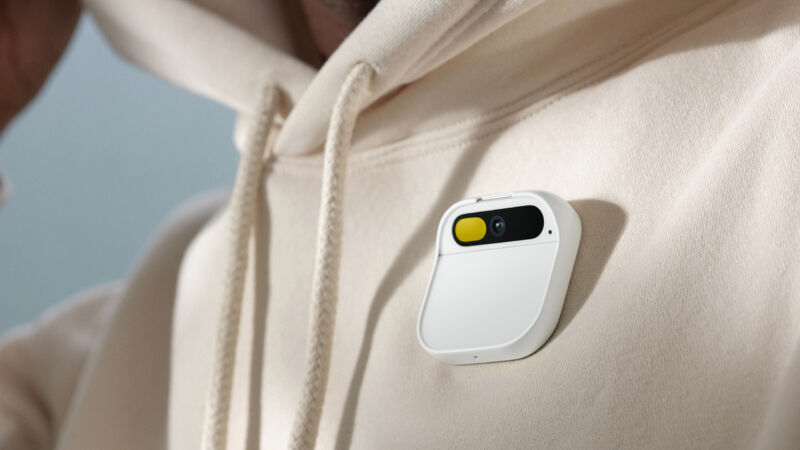The definition of Dead-on-Arrival —
One month after launch of its “smartphone replacement,” Humane already seems doomed.

Enlarge / The Humane AI Pin. It has a magnetic back, so it sticks to your clothing like a name tag.
Humane
The wearable startup Humane, makers of the bizarre Humane AI Pin, is already looking for the exit. Bloomberg reports the company is seeking a sale after its first and only product launch was a big flop. Despite seemingly having nothing else in the pipeline and the AI Pin being dead on arrival, Bloomberg reports the company is “seeking a price of between $750 million and $1 billion in a sale.” Humane was founded by two ex-Apple employees, Imran Chaudhri and Bethany Bongiorno, in 2018 and has raised $230 million from some big-name investors like OpenAI CEO Sam Altman.
The Humane AI Pin immediately seemed like an idea that only made sense in a VC pitch room. The device is a wearable voice command box and camera that you magnetically clip onto a shirt, sort of like a Star Trek communicator. It wanted to replace your smartphone yet had no traditional display, and the company bragged in the launch video: “We don’t do apps.” That means you’re left with mostly voice commands for whatever the voice command system can process. You could press on the front and ask a question. The camera could also be involved in a “what’s this thing?” capacity.
While there was no onboard display, it did have a one-color 720p laser projection system that would project onto your hand. The UI looked just like a smartwatch, and you controlled it with the same hand you’re using as a projection screen. You could tilt your palm around to select something and tap your fingers together to confirm, all the while distorting and moving the “display” being projected onto your hand. The smartwatch-like UI raises the question: “Why not just wear a smartwatch instead?” Then you’d have real apps, a real display, a less-weird form factor, better input, and better voice commands, and it would probably cost less. Oh, yeah, about that price: The Humane AI Pin was $700 plus a $24-a-month subscription fee, while an Apple Watch Series 9 is $400.
Besides all those “on-paper” problems, the device was also universally panned once it landed in the hands of reviewers. The device comes in two halves, with a front processing unit and a back battery, and the side clipped together magnetically with your shirt in the middle. It turns out a shirt is not a great support substrate for the rather heavy device, and it drags down a lot of lighter clothes. Like all projector-based displays, the laser projector does not work well outside of a dark room. The voice response time is really slow, and the device is warm all the time, which is an odd sensation when it’s pressed against your chest. The battery life is between two and four hours. It can’t do a lot of basic things like set an alarm or timer. Review conclusions range from The Verge’s “not even close” to Marques Brownlee’s “the worst product I’ve ever reviewed.”
No one knows what sales were like for the company, but the AI Pin only started shipping in April. To already have the founders running for the exits a single month after launch sounds pretty dire. It’s hard to imagine a worse timeline of events and hard to imagine anyone paying $750 million for a company that seems to be swirling the drain. Don’t be surprised if history places Humane on the list of “biggest tech startup flops ever” alongside the likes of Juicero and Ouya.